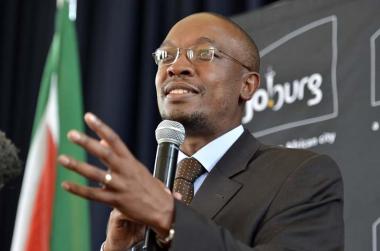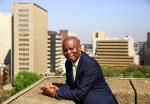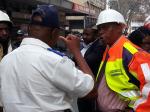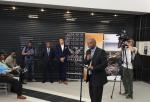City of Joburg draws big investments, Mayor says
 Joburg City mayor Parks Tau delivered his State of the City Address, saying the city was being redesigned through the corridors of freedom, aimed at revitalising old suburbs and bridging the gaps between poorer and wealthier areas.
Joburg City mayor Parks Tau delivered his State of the City Address, saying the city was being redesigned through the corridors of freedom, aimed at revitalising old suburbs and bridging the gaps between poorer and wealthier areas.
Johannesburg City mayor Parks Tau delivered his State of the City Address (Soca), saying the city’s economy has grown significantly thanks to various developmental initiatives put in place by his administration.
At least R14 billion in investments had seen the economic development of the City of Johannesburg, resulting in economic hubs that created jobs and further opportunities for the city’s citizens, Mayor Parks Tau said on Wednesday at Turffontein racecourse.
"We have rolled out the most ambitious youth empowerment programme in the country, partnering with more than 250 companies from the city and elsewhere," said Mr Tau.
The city is being redesigned through the corridors of freedom, aimed at revitalising old suburbs and bridging the gaps between poorer and wealthier areas.
Suburbs of Fleurhof and South Hills, Kliptown and Jabulani, Turffontein and Rosettenville, the student halls and shopping squares of Empire Road, Randburg, Jabulani, Orlando East, Park Station, Louis Botha Avenue, Alexandra and Sandton were areas that had been, and would be, improved through the corridors of freedom, he said.
It was Mr Tau’s last in his current term of office and was billed as a recap of the work of his administration.
Mr Tau said the exclusive multibillion-rand Waterfall Estate in Midrand‚ where the Mall of Africa recently opened‚ will soon accommodate social housing‚ allowing the rich and poor to live together in the precinct.
"We engaged with the developers of the new town in Waterfall Estate and Modderfontein to ensure there will be affordable housing included in these new mega developments‚" Tau said.
"We can say to the people of Johannesburg that we have successfully negotiated with the developer that this should not be an enclave of the rich.
"We said there must be social housing in Waterfall Estate. The same deal applies to Modderfontein development, where we have entered into a similar agreement."
Mr Tau opened his speech by referring to the nine weeks of public consultation in 2011 that led to the city’s growth and development strategy, which runs until 2040, describing it as a "a covenant to build a new economic democracy".
"On the basis of this covenant we have begun redesigning the city through the corridors of freedom," Mr Tau said.
He has made spatial reconfiguration of the Johannesburg region one of the central policies of his administration, with much of the speech focusing on urban redevelopment.
The corridors of freedom plan aims, among other things, to combat apartheid era spatial planning by through establishing bus rapid transport routes alongside mixed-use urban redevelopment, including social housing.
"This means more people along a range of incomes are able to live richer lives much closer to where they live, work and play," he said.
It is unclear whether Mr Tau will be retained as the African National Congress’s (ANC) mayoral candidate in the August 3 polls. The party has said it will announce ahead of time its choices to lead key metros.
The City of Johannesburg is one of three metros in Gauteng that are expected to be heavily contested.
Speaking ahead of Mr Tau’s speech, Democratic Alliance (DA) mayoral candidate Herman Mashaba said the city needed to reach a 5% growth rate to begin making a significant dent in unemployment, poverty and inequality.
City of Joburg has big plans
Mr Tau has already said that R100bn has been allocated for the construction of the corridors of freedom, with significant further expenditure in ICT, including fibre networks, to lower the cost of digital communication.
"Of all the metro. municipalities and local government, we are least dependent on national government transfers for our capital expenditure," he said.
Due to the city’s policy on the township economy "billions of rands of purchasing power hidden in our township and informal settlements is being unleashed," he said.
Mr Tau said the city‚ through the urban development zone tax in Sandton‚ was now celebrating R14bn in investment, which has brought new development in the Maboneng precinct and in the "new Braamfontein we see today".
"We are complementing this with better street trading systems in the inner-city‚ a trading sector with three of the CBD streets, with a turnover of R10bn per annum.
"We have installed our own high-capacity fibre optic network, which we are now deploying as an asset to develop and democratise the city and bridging the digital divide‚" Tau said.
He said the City of Johannesburg was the biggest spender per capita in the country after the national government.
The city’s draft integrated development plan 2016 to 2021 estimates economic growth in the metro at between 1% to 2% for the medium term.
Mr Tau said street crime rates in central Johannesburg had declined in the past five years, and he attributed this to the city’s smart policing strategy. A new cable theft response system was being implemented, he said.
Mr Tau said the city had now audited informal settlements, leading to housing upgrades for 30,000 dwellings. "We have as a city done a comprehensive audit of our 181 informal settlements, and their 168,000 households, the majority of which have access to basic water and electricity," he said.
The majority of those living in informal dwellings now lived in backyard shacks, attached to formal dwellings, he said. This required new approaches to housing expenditure.

















